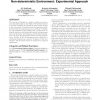Free Online Productivity Tools
i2Speak
i2Symbol
i2OCR
iTex2Img
iWeb2Print
iWeb2Shot
i2Type
iPdf2Split
iPdf2Merge
i2Bopomofo
i2Arabic
i2Style
i2Image
i2PDF
iLatex2Rtf
Sci2ools
ATAL
2009
Springer
2009
Springer
Decommitting in multi-agent execution in non-deterministic environment: experimental approach
The process of planning in complex, multi-actor environment depends strongly on the ability of the individual actors to perform intelligent decommitment upon specific changes in the environment. Reasoning about decommitment alternatives during the planning process contributes to flexibility and robustness of the resulting plan. In this article we formally introduce and discuss three specific decommitment rules: (i) relaxation, (ii) delegation and (iii) full decommitment. We argue that appropriate selection, setting and preference ordering of the decommitment rules contributes to robustness (measured as a number of failures) of the overall plans. The presented claims are supported by empirical experiments. Categories and Subject Descriptors I.2.11 [Computing Methodologies]: Artificial Intelligence— Intelligent agents; I.2.8 [Computing Methodologies]: Artificial Intelligence—Plan execution, formation, and generation General Terms Measurement, Performance, Reliability, Experimen...
Artificial Intelligence | ATAL 2009 | Decommitment Rule | Intelligence— Intelligent Agents | Specific Decommitment Rules |
| Added | 26 May 2010 |
| Updated | 26 May 2010 |
| Type | Conference |
| Year | 2009 |
| Where | ATAL |
| Authors | Jirí Vokrínek, Antonín Komenda, Michal Pechoucek |
Comments (0)

